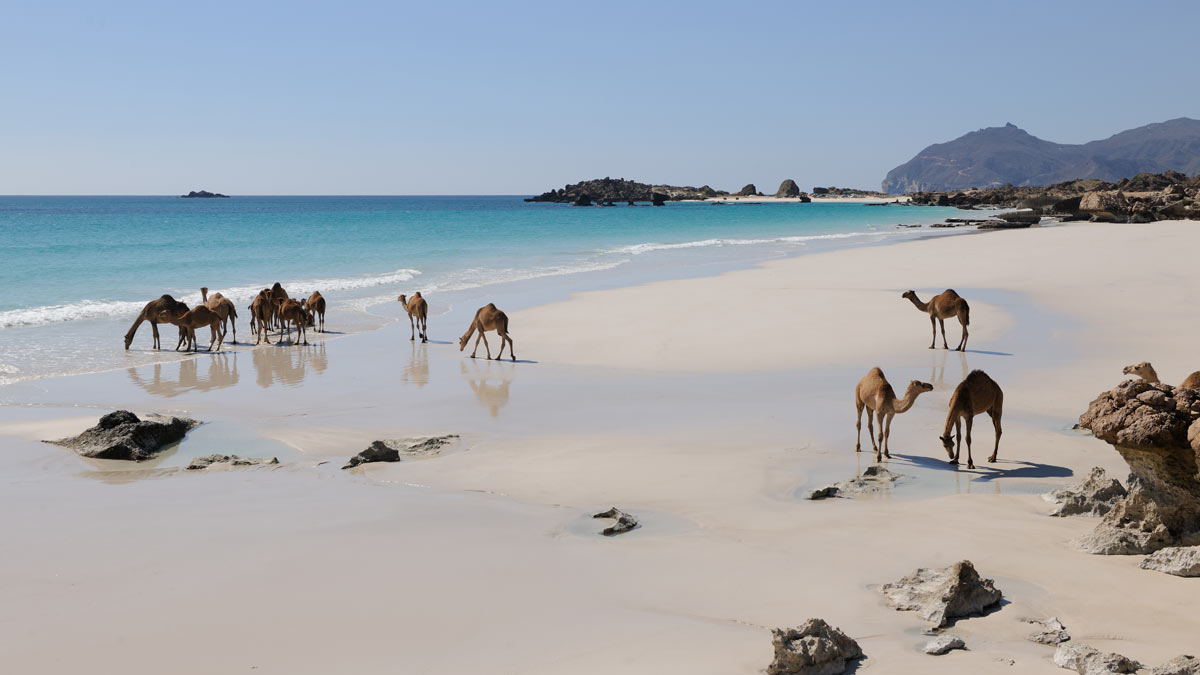Unveiling Salalah: Ancient frankincense, dramatic wadis and pristine beaches
 Camels stroll on the beaches in Dhofar | Chandreyi Bandyopadhyay
Camels stroll on the beaches in Dhofar | Chandreyi Bandyopadhyay
The birthplace of Sultan Qaboos bin Said, Salalah, is the capital of the Dhofar region in Oman, over 1,000km away from Muscat. It is a world apart from the sun-scorched landscapes often associated with the Arabian Peninsula. Here, the annual Khareef monsoon cloaks the land in mist between July and September, transforming the desert into a lush, emerald paradise—a spectacle unlike anywhere else in the Middle East. But beyond its fleeting green season, Salalah is also a treasure trove of ancient heritage, rich traditions, and coastal beauty - the true land of frankincense—a coveted element for luxury fragrances across the globe and holding the prized treasure of ancient maritime heritage.
Start your journey inland towards Jabal Samhan, a dramatic plateau rising above the Dhofar coastline. In the khareef season (June to September), the mountains are swaddled in cool mist and low-hanging clouds that gently caress your skin. The air smells faintly of wild grass and damp earth, and from the top, the views spill endlessly over deep canyons and the Arabian Sea beyond. Pack a picnic of local dates, Omani flatbread, and laban (a yoghurt drink) to enjoy on the summit, while watching herds of camels stroll languidly across the high plains before making their way to the beaches below. The sight of their silhouettes against the turquoise waters is one you won’t forget.
For a taste of the coast, head west to Mughsail Beach, where the surf crashes dramatically against white sand and limestone cliffs. Natural blowholes shoot seawater into the air with every crashing wave, the drive along the cliffside road offering picture-perfect views of the Arabian Sea. Eastward, Fazayah Beach hides a string of secluded coves with powder-soft sand and impossibly clear waters—ideal for an afternoon of pure, undisturbed relaxation.
Down in the city, the Al Haffa Souq introduces the first immersion in the region’s frankincense trade. Stalls overflow with resin in shades of gold and ivory, alongside intricately woven Omani caps, silver jewellery, and spices. Make a point to visit the Al Baleed Archaeological Park, where a well endowed maritime museum tells stories of Dhofar as the beating heart of the incense trade, from China to Africa. The museum gives context to the city’s maritime and cultural history with an ancient frankincense tree adorning the central courtyard.
No trip to Salalah is complete without venturing into the wadis of Dhofar, which burst into life during Khareef. Wadi Darbat, with its cascading waterfalls, emerald pools, and gently flowing rivers, feels almost tropical. Families gather under shady trees for leisurely picnics, while small boats glide across the still waters. Further afield, Wadi Ayn offers a dramatic contrast, with towering cliffs framing a deep pool at the base of a natural spring. These pockets of greenery, set against the rugged Omani landscape, reveal a softer, more unexpected side of the desert.
Salalah’s food reflects a blend of Omani tradition with Yemeni influence. Try mashuai, a whole kingfish grilled and served with lemon rice, or ma’ajoon, a spiced date paste eaten with warm bread. The seafood is exceptional—grilled prawns, lobster, and freshly caught snapper are served at casual beachside restaurants within the marina town Hawana Salalah. Don’t leave without sampling shawarma wrapped in soft Arabic bread or the delicate halwa flavoured with saffron and rosewater. It is not difficult to find Om-Ali and Kunafa, the popular desserts and Shuwa, a lamb meat and rice preparation served during Ramadan at good restaurants.
Accommodation here ranges from opulent resorts to intimate boutique stays. For an indulgent retreat, Al Baleed Resort by Anantara offers private pool villas, serene spa treatments, and direct beach access. The sleek Alila Hinu Bay, located west of Salalah along a rugged and untouched coastline, blends minimalist design with Omani warmth—perfect for travellers seeking luxury paired with seclusion. For something quieter, boutique guesthouses in the Dhofar countryside give you the chance to wake up to the sight of mist-draped hills and the sound of distant camel bells. Juweirah boutique hotel on the other hand offers an adults only retreat.
As evening falls, the city’s palm-fringed coastline glows under the warm sunset hues, while the fragrance of frankincense wafts through the streets. Salalah offers many contrasts—lush green mountains meeting azure seas, ancient trade routes blending with modern comfort, and a sense of timelessness that lingers long in memories.
Chandreyi Bandyopadhyay is a freelance journalist capturing wildlife, culture and lesser known destinations on her travels. She can be reached at @themoonchasersofficial on Instagram
Tourism